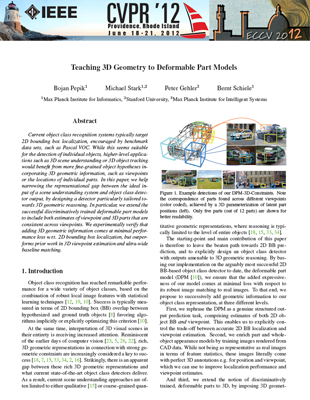Seminar on Current Works in Computer Vision
Prof. Thomas BroxComputer Vision is a very active research field with many practical applications, for instance in quality control, robotics, or driving assistance systems. The ultimate goal of Computer Vision is to imitate the great capabilies of the human visual system, allowing the computer not only to record images but also to interpret them. Research is still far from this goal, but significant progress has been made in recent years.
In this seminar we will take a detailed look at the most interesting recent works that have been published at the latest Computer Vision conferences CVPR 2012 and ECCV 2012. You will read a number of research papers published at these conferences. For each paper there will be one person, who performs a more detailed investigation of the research work and its background and gives a presentation. The presentation is followed by a discussion with all participants about the merits and limitations of the respective paper. You will learn to read and understand contemporary research papers, to give a good oral presentation, to ask questions, and to openly discuss a research problem.
|

|
Slides of first session with instructions for a good presentation
Powerpoint template (optional)
Papers:
| Date | Topic | Paper | Questions | Presenting student | Slides | Advisor |
| 05.12. | Optical flow with occlusion modeling | Unger et al. | Questions | Martin Goth | Benjamin Drayer | |
| 12.12. | Recognition with 3D object models | Pepik et al. | Questions | Janosch Scharlipp | Kun Liu | |
| 19.12. | Synthetic movie for benchmarking | Butler et al. | Questions | Brian Davis | Robert Bensch | |
| 09.01. | Detector learning from videos | Prest et al. | Questions | Anton Böhm | Thorsten Schmidt | |
| 16.01. | Registration of different object instances | Kemelmacher et al. | Questions | Carl Faure | Benjamin Drayer | |
| 23.01. | Clustering in part-based detection | Divvala et al. | Questions | Manuel Bühler | Alexey Dosovitskiy | |
| 30.01. | Object class detection | Hoiem et al. | Questions | Dominik Gebhart | Naveen Shankar Nagaraja | |
| 06.02. | Object clustering and classification | Hariharan et al. | Questions | Nikolaus Mayer | Philipp Fischer | |
| 13.02. | Convolutional deep belief networks | Huang et al. | Questions | Cem Uran | Ahmed Abdulkadir | |


